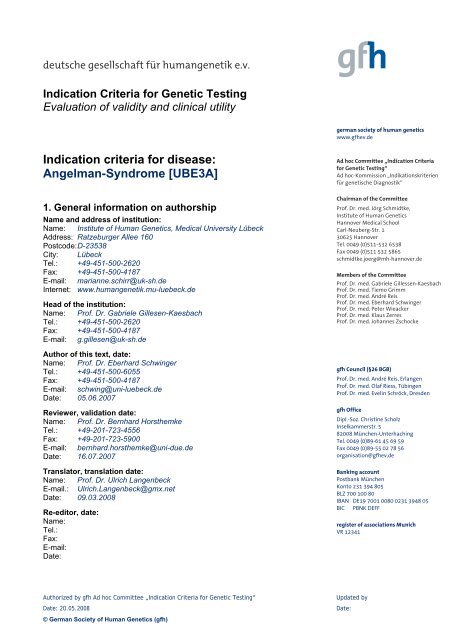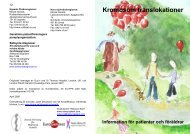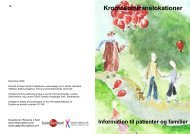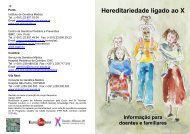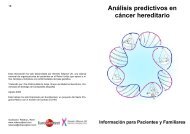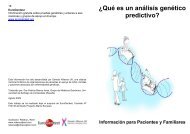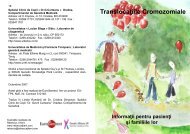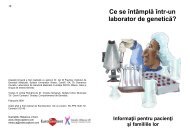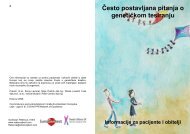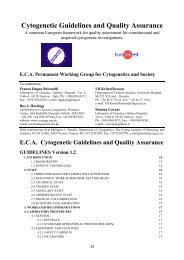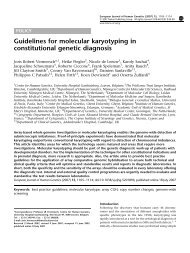Indication Criteria for Genetic Testing - EuroGentest
Indication Criteria for Genetic Testing - EuroGentest
Indication Criteria for Genetic Testing - EuroGentest
You also want an ePaper? Increase the reach of your titles
YUMPU automatically turns print PDFs into web optimized ePapers that Google loves.
deutsche gesellschaft für humangenetik e.v.<br />
<strong>Indication</strong> <strong>Criteria</strong> <strong>for</strong> <strong>Genetic</strong> <strong>Testing</strong><br />
Evaluation of validity and clinical utility<br />
<strong>Indication</strong> criteria <strong>for</strong> disease:<br />
Angelman-Syndrome [UBE3A]<br />
1. General in<strong>for</strong>mation on authorship<br />
Name and address of institution:<br />
Name: Institute of Human <strong>Genetic</strong>s, Medical University Lübeck<br />
Address: Ratzeburger Allee 160<br />
Postcode: D-23538<br />
City: Lübeck<br />
Tel.: +49-451-500-2620<br />
Fax: +49-451-500-4187<br />
E-mail: marianne.schirr@uk-sh.de<br />
Internet: www.humangenetik.mu-luebeck.de<br />
Head of the institution:<br />
Name: Prof. Dr. Gabriele Gillesen-Kaesbach<br />
Tel.: +49-451-500-2620<br />
Fax: +49-451-500-4187<br />
E-mail: g.gillesen@uk-sh.de<br />
Author of this text, date:<br />
Name: Prof. Dr. Eberhard Schwinger<br />
Tel.: +49-451-500-6055<br />
Fax: +49-451-500-4187<br />
E-mail: schwing@uni-luebeck.de<br />
Date: 05.06.2007<br />
Reviewer, validation date:<br />
Name: Prof. Dr. Bernhard Horsthemke<br />
Tel.: +49-201-723-4556<br />
Fax: +49-201-723-5900<br />
E-mail: bernhard.horsthemke@uni-due.de<br />
Date: 16.07.2007<br />
Translator, translation date:<br />
Name: Prof. Dr. Ulrich Langenbeck<br />
E-mail.: Ulrich.Langenbeck@gmx.net<br />
Date: 09.03.2008<br />
Re-editor, date:<br />
Name:<br />
Tel.:<br />
Fax:<br />
E-mail:<br />
Date:<br />
Authorized by gfh Ad hoc Committee „<strong>Indication</strong> <strong>Criteria</strong> <strong>for</strong> <strong>Genetic</strong> <strong>Testing</strong>“ Updated by<br />
Date: 20.05.2008<br />
© German Society of Human <strong>Genetic</strong>s (gfh)<br />
Date:<br />
german society of human genetics<br />
www.gfhev.de<br />
Ad hoc Committee „<strong>Indication</strong> <strong>Criteria</strong><br />
<strong>for</strong> <strong>Genetic</strong> <strong>Testing</strong>“<br />
Ad hoc-Kommission „Indikationskriterien<br />
für genetische Diagnostik“<br />
Chairman of the Committee<br />
Prof. Dr. med. Jörg Schmidtke,<br />
Institute of Human <strong>Genetic</strong>s<br />
Hannover Medical School<br />
Carl-Neuberg-Str. 1<br />
30625 Hannover<br />
Tel. 0049 (0)511-532 6538<br />
Fax 0049 (0)511 532 5865<br />
schmidtke.joerg@mh-hannover.de<br />
Members of the Committee<br />
Prof. Dr. med. Gabriele Gillessen-Kaesbach<br />
Prof. Dr. med. Tiemo Grimm<br />
Prof. Dr. med. André Reis<br />
Prof. Dr. med. Eberhard Schwinger<br />
Prof. Dr. med. Peter Wieacker<br />
Prof. Dr. med. Klaus Zerres<br />
Prof. Dr. med. Johannes Zschocke<br />
gfh Council (§26 BGB)<br />
Prof. Dr. med. André Reis, Erlangen<br />
Prof. Dr. med. Olaf Riess, Tübingen<br />
Prof. Dr. med. Evelin Schröck, Dresden<br />
gfh Office<br />
Dipl.-Soz. Christine Scholz<br />
Inselkammerstr. 5<br />
82008 München-Unterhaching<br />
Tel. 0049 (0)89-61 45 69 59<br />
Fax 0049 (0)89-55 02 78 56<br />
organisation@gfhev.de<br />
Banking account<br />
Postbank München<br />
Konto 231 394 805<br />
BLZ 700 100 80<br />
IBAN DE19 7001 0080 0231 3948 05<br />
BIC PBNK DEFF<br />
register of associations Munich<br />
VR 12341
gfh Ad hoc Committee <strong>Indication</strong> <strong>Criteria</strong> <strong>for</strong> <strong>Genetic</strong> <strong>Testing</strong> page 2<br />
2. Disease characteristics<br />
2.1 Name of the Disease (Synonyms): Angelman syndrome<br />
2.2 OMIM# of the Disease: 105830<br />
2.3 Name of the Analysed Genes or DNA/Chromosome Segments:<br />
UBE3A / #15q11-q13<br />
2.4 OMIM# of the Gene(s): 601623<br />
2.5 Mutational Spectrum:<br />
70% maternal deletion 15q11-q13<br />
1% paternal uniparental disomy [upd(15)pat]<br />
3% imprinting defect<br />
15% mutations in UBE3A gene<br />
10% other<br />
2.6 Analytical Methods:<br />
methylation test, FISH, microsatellite analysis, MLPA;<br />
if methylation is normal > search <strong>for</strong> UBE3A mutations<br />
2.7 Analytical Validation<br />
parallel analysis of positive and negative controls<br />
2.8 Estimated Frequency of the Disease in Germany<br />
(Incidence at birth ("birth prevalence") or population prevalence):<br />
prevalence at birth 1:12,000-1:20,000<br />
2.9 If applicable, prevalence in the ethnic group of investigated person:<br />
not applicable<br />
2.10 Diagnostic Setting:<br />
A. (Differential)diagnostics<br />
B. Predictive <strong>Testing</strong><br />
C. Risk assessment in Relatives<br />
D. Prenatal<br />
Comment: none<br />
_______________________________________________________________<br />
© German Society of Human <strong>Genetic</strong>s (gfh)<br />
Yes. No.
gfh Ad hoc Committee <strong>Indication</strong> <strong>Criteria</strong> <strong>for</strong> <strong>Genetic</strong> <strong>Testing</strong> page 3<br />
3. Test characteristics<br />
3.1 Analytical Sensitivity<br />
(proportion of positive tests if the genotype is present)<br />
practically 100%<br />
3.2 Analytical Specificity<br />
(proportion of negative tests if the genotype is not present)<br />
practically 100%<br />
3.3 Clinical Sensitivity<br />
(proportion of positive tests if the disease is present)<br />
The clinical sensitivity can be dependent on variable factors such as age or<br />
family history. In such cases a general statement should be given, even if a<br />
quantification can only be made case by case.<br />
85-90%<br />
3.4 Clinical Specificity<br />
(proportion of negative tests if the disease is not present)<br />
The clinical specificity can be dependent on variable factors such as age or<br />
family history. In such cases a general statement should be given, even if a<br />
quantification can only be made case by case.<br />
practically 100%<br />
3.5 Positive clinical predictive value<br />
(life time risk to develop the disease if the test is positive).<br />
practically 100%<br />
3.6 Negative clinical predictive value<br />
(Probability not to develop the disease if the test is negative).<br />
Assume an increased risk based on family history <strong>for</strong> a non-affected person.<br />
Allelic and locus heterogeneity may need to be considered.<br />
Index case in that family had been tested:<br />
practically 100%<br />
Index case in that family had not been tested:<br />
can only be clarified through analysis of the non-affected individual<br />
_______________________________________________________________<br />
© German Society of Human <strong>Genetic</strong>s (gfh)
gfh Ad hoc Committee <strong>Indication</strong> <strong>Criteria</strong> <strong>for</strong> <strong>Genetic</strong> <strong>Testing</strong> page 4<br />
4. Clinical Utility<br />
4.1 (Differential)diagnosis: The tested person ist clinically affected<br />
(To be answered if in 2.10 "A" was marked)<br />
4.1.1 Can a diagnosis be made other than through a genetic test?<br />
No. (continue with 4.1.4)<br />
Yes,<br />
clinically.<br />
imaging .<br />
endoscopy.<br />
biochemistry.<br />
electrophysiology.<br />
other (please describe)<br />
4.1.2 Describe the burden of alternative diagnostic methods to the patient<br />
4.1.3 How ist the cost effectiveness of alternative diagnostic methods to be<br />
judged?<br />
4.1.4 Will disease management be influenced by the result of a genetic test?<br />
No.<br />
Yes.<br />
Therapy (please describe)<br />
Prognosis (please describe)<br />
Management (please describe)<br />
_______________________________________________________________<br />
© German Society of Human <strong>Genetic</strong>s (gfh)
gfh Ad hoc Committee <strong>Indication</strong> <strong>Criteria</strong> <strong>for</strong> <strong>Genetic</strong> <strong>Testing</strong> page 5<br />
4.2 Predictive Setting: The tested person is clinically unaffected but<br />
carries an increased risk based on family history<br />
(To be answered if in 2.10 "B" was marked)<br />
4.2.1 Will the result of a genetic test influence lifestyle and prevention?<br />
If the test result is positive (please describe)<br />
If the test result is negative (please describe)<br />
4.2.2 Which options in view of lifestyle and prevention does a person at-risk<br />
have if no genetic test has been done (please describe)?<br />
4.3 <strong>Genetic</strong> risk assessment in family members of a diseased person<br />
(To be answered if in 2.10 "C" was marked)<br />
4.3.1 Does the result of a genetic test resolve the genetic situation in that<br />
family?<br />
No.<br />
4.3.2 Can a genetic test in the index patient save genetic or other tests in<br />
family members?<br />
see 4.3.1<br />
4.3.3 Does a positive genetic test result in the index patient enable a<br />
predictive test in a family member?<br />
not applicable<br />
4.4 Prenatal diagnosis<br />
(To be answered if in 2.10 "D" was marked)<br />
4.4.1 Does a positive genetic test result in the index patient enable a prenatal<br />
diagnostic?<br />
Yes.<br />
5. If applicable, further consequences of testing<br />
Please assume that the result of a genetic test has no immediate medical<br />
consequences. Is there any evidence that a genetic test is nevertheless useful<br />
<strong>for</strong> the patient or his/her relatives? (Please describe)<br />
Parents will finally know the cause of the disease.<br />
_______________________________________________________________<br />
© German Society of Human <strong>Genetic</strong>s (gfh)


